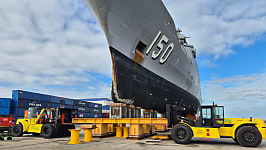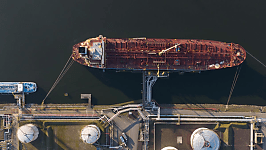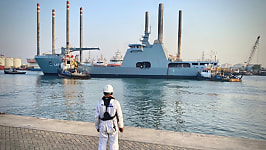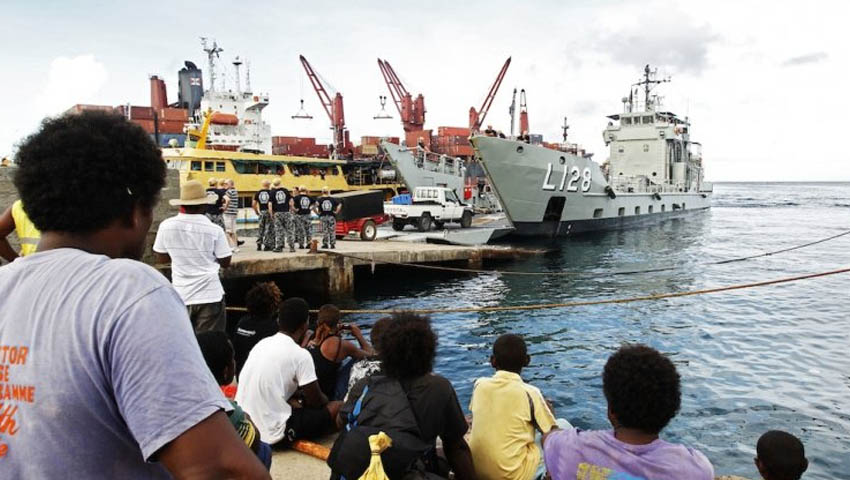To the shock of many, it has been revealed that a Chinese company linked to a state-owned enterprise is trying to lease the island of Tulagi in the Solomon Islands, with plans to turn the island into a “special economic zone”, presenting Australia with a new factor for its increasingly complex strategic calculus.
China has moved to expand its soft power into Australia’s backyard – the south Pacific. The increased push for critical infrastructure development, debt relief and financing has prompted the Australian government to initiate the Pacific Step-up program; however, no one has stopped to ask: what is China’s end goal?
Like every ascendent economic, political and strategic power, China has used its period of rapid industrialisation and economic expansion to begin establishing its position within the broader global context.
Fuelled by a long memory of a “century of humiliation” at the hands of Western imperialism, finally ending with the successful Communist Revolution in 1949, China and its political leaders have dedicated the nation to establishing a new era of Chinese global primacy.
As China’s position within the global order has evolved and its ambitions towards the Indo-Pacific in particular have become increasingly apparent, the Chinese government, driven by an extremely ambitious leader, President Xi Jinping, has identified a number of factors of both internal and external concern for the rising superpower’s status.
These concerns extend to traditional areas of Chinese focus, namely, central Asia, Tibet and the Taiwan situation, and more concerning for nations like Australia, the south Pacific and south-east Asia – further compounding these issues is America’s resurgence, characterised by what China described as “intensified competition among major countries, significantly increased its defence expenditure, pushed for additional capacity in nuclear, outer space, cyber and missile defence, and undermined global strategic stability”.
In response, the Australian government and Prime Minister Scott Morrison have kicked off the renewed Pacific Step-up program to counter the growing economic, political and diplomatic influence of China as a result of the growing expansion of the Belt and Road Initiative (BRI) – the Lowy Institute recently identified the growing power and influence China’s BRI program has in supporting the Pacific.
“Infrastructure remains a crucial requirement for ensuring resilience in the Pacific. Considering the opportunities for collective engagement with the Belt and Road Initiative merit careful analysis and discussion, particularly given that nine forum member countries have already signed bilateral memoranda of understanding to cooperate with China on the BRI,” it said.
Hearts and minds in the Pacific
Enter the Solomon Islands and the key strategic island of Tulagi, which, it has emerged, is now the focal point of China’s reinvigorated focus on the Pacific, bringing the global superpower into direct competition with Australia and the Prime Minister’s signature foreign policy and soft power platform: the Pacific Step-up.
Tulagi served as a key battleground during the Pacific campaign against Imperial Japan during the Solomon Islands Campaign of 1942, which played host to a Japanese navy and seaplane base for supporting Japanese forces fighting in Guadalcanal, with a secondary role of intercepting supply routes between the mainland United States and Australia.
China has recognised the importance of the island, with the China Sam Enterprise Group signing a 75-year lease for Tulagi alongside the construction of an oil and gas terminal, a fishing harbour and a signature Chinese “special economic zone” right on the doorstep of Australia.
Tulagi is but a canary in the coal mine for China’s ambitions in the Pacific, with a number of Chinese-owned, state-backed companies jockeying for lucrative deals to support the rising superpower’s ambitions in the region. China Civil Engineering Construction Corporation, a large investor in neighbouring Vanuatu, and the China Railway International have used promises of US$500,000 in loans and grants and plans to lend US$825 million to revive a defunct gold mine to sway the Pacific island nations.
The Chinese people have long prided themselves as being students of history – the overt expansion of Chinese strategic capability and high-end military capability, particularly power projection forces, has drawn the attention of Australian, US and allied regional policymakers and strategic thinkers who have asked questions about the tactical and strategic intent behind the development of these forces.
Shifting the focus towards China’s ambitious designs and infrastructure packages offered to a range of Pacific island nations, including Papua New Guinea and Fiji, these nations represent incredibly small markets for Chinese-produced consumer goods, with limited natural resources and are of limited, if any, strategic value in the event of conflict.
Japan learned the lesson of overreaching in the Pacific during the Second World War as the Pacific island hopping campaign strained the ability of the Imperial Japanese Armed Forces to adequately support and supply deployed forces throughout the far-flung islands and coral atolls in the Pacific – once again raising the question, what is the end goal of China’s infrastructure program?
It is equally important to take a closer look at the existing examples of China’s BRI program and infrastructure financing programs as they have been rolled out throughout the Indo-Pacific and into Africa, with examples in Sri Lanka’s Magampura Mahinda Rajapaksa Port located in Hambantota, which was financed by Chinese firms.
Looking to Africa, Chinese “debt traps” in south-eastern Africa have resulted in the Chinese repossession of airports, mines, railways and similar infrastructure following the failure to service the loans by local governments – leaving these nations indebted to China with little to no control over their economic, political and strategic destiny.
Questions for Australia
Despite Australia’s enduring commitment to the Australia-US alliance, serious questions remain for Australia in the new world order of President Donald Trump’s America, as a number of allies have been targeted by the maverick President for relying on the US for their security against larger state-based actors, which has seen the President actively pressuring key allies, particularly NATO allies, to renegotiate the deals.
Enhancing Australia’s capacity to act as an independent power, incorporating great power-style strategic economic, diplomatic and military capability serves as a powerful symbol of Australia’s sovereignty and evolving responsibilities in supporting and enhancing the security and prosperity of Indo-Pacific Asia.
Shifting the public discussion away from the default Australian position of “it is all a little too difficult, so let’s not bother” will provide unprecedented economic, diplomatic, political and strategic opportunities for the nation.
However, as events continue to unfold throughout the region and China continues to throw its economic, political and strategic weight around, can Australia afford to remain a secondary power or does it need to embrace a larger, more independent role in an era of increasing great power competition? Further to this, without adding a degree of cynicism to the debate, what is China's end goal for this focus on Australia's backyard?
Get involved with the discussion and let us know your thoughts on Australia's future role and position in the US alliance structure and the Indo-Pacific more broadly in the comments section below, or get in touch with
Stephen Kuper
Steve has an extensive career across government, defence industry and advocacy, having previously worked for cabinet ministers at both Federal and State levels.









